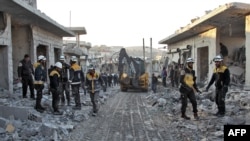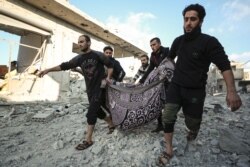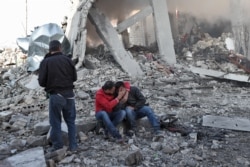A recent military escalation by Russian and Syrian government forces in the rebel-held northwestern Syrian province of Idlib is likely to continue in the coming weeks, experts say.
On Saturday, a series of airstrikes and barrel bombings carried out by Russian fighter jets and Syrian helicopters targeted several villages in Idlib, killing at least 18 civilians and wounding dozens of others, local news sources reported.
The Syrian Observatory for Human Rights, a war monitor that has researchers across the country, said all areas targeted in the recent attack were largely populated by civilians.
Rami Abdulrahman, director of the Syrian Observatory, said clear skies in recent days have allowed Syrian and Russian warplanes to increase their airstrikes on the civilian population in Idlib.
“It seems that improving weather conditions always bring woes for Idlib residents,” he told VOA on Sunday.
“Russian and Syrian regime airstrikes have increased since mid-November,” Abdulrahman added.
He noted that, “Saturday’s massacre was the biggest attack since the recent escalation has begun.”
Civilians fleeing
Rights groups said thousands of people in parts of Idlib and a nearby province have fled their homes in recent weeks due to the ongoing Russian and Syrian military campaign.
More than 92,000 civilians from Idlib’s south and Hama’s north already have been displaced in the past few weeks, according to the Emergency Response Coordinators, a local group that rescues civilians caught in the conflict.
The Idlib province, home to nearly 3 million people, is the last major stronghold of rebel forces fighting Syrian President Bashar al-Assad’s regime. Idlib is largely controlled by the Islamist militant group Hayat Tahrir al-Sham (HTS), a former al-Qaida affiliate in Syria.
For years, Idlib has been a center of contention between Russia and Turkey, two powers that support opposite sides of Syria’s eight-year conflict.
In September 2018, Moscow and Ankara reached an agreement that postponed a planned Syrian regime offensive on Idlib and other areas near the Turkish border.
As part of that agreement, Turkey was required to remove all extremist groups from the province, some of which are allied with the al-Qaida terror group.
But Turkey has allegedly failed to implement its part of the deal.
Russia acting on its own terms
Some experts charge the ongoing push to recapture Idlib from rebels indicates Russia’s intention to end the conflict in Idlib.
“Moscow is determined to bring an end to this war on its terms,” said John Saleh, a Syrian researcher based in Washington.
“Russian and Syrian regime attacks on Idlib are part of a larger understanding with Turkey. Ankara has failed to remove its extremist allies from Idlib and so it has yielded to Moscow to take care of it,” he told VOA.
In return, Saleh added, Russia has turned a blind eye on Turkey’s continued operation against U.S.-backed Kurdish forces in Syria’s northeast.
In early October, Turkey military and allied Syrian militia fighters began an offensive to remove Kurdish-led Syrian Democratic Forces from parts of northeast Syria. Ankara views Syrian Kurdish fighters as terrorists and has opposed Washington’s support for them.
“You cannot separate what’s happening in northeast Syria from the ongoing situation in Idlib,” said Hadeel Oueis, a Syria expert in Washington.
“Russia and Turkey want to prove that they have the upper hand in Syria, and they’ll continue their coordination as such,” she told VOA.
Oueis noted that on the same day Russian President Vladimir Putin and his Turkish counterpart Recep Tayyip Erdogan met in October in Sochi, Russia, to agree on cooperating in northeast Syria, Syrian President Bashar al-Assad was seen in Idlib, where he vowed to retake control of Idlib.






